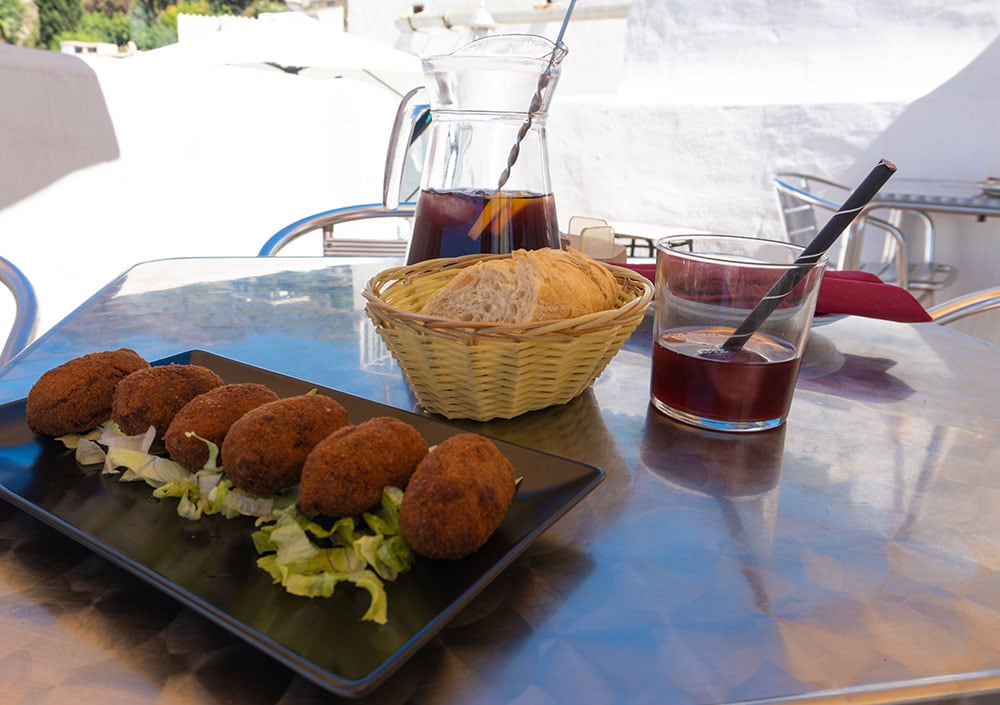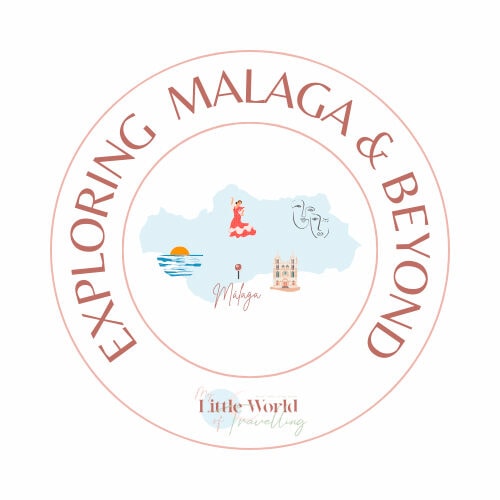The Legal Drinking Age in Spain: Guide by a Spaniard (2025)
Are you wondering about the legal drinking age in Spain?
Before travelling to Spain and participating in any activities that might involve drinking alcohol, like a winery tour, you must be aware of the drinking laws.
The legal drinking age in Spain is 18 years old. Unlike countries like the US, Spain has only one legal drinking age that applies to the whole country, including the islands. This makes it easy to remember.
Having been born and raised in Spain, I know about the rules, and although I barely drink alcoholic drinks, I occasionally enjoy a glass of sangria or cocktail.
In this blog, you will find some key information on the rules for drinking in Spain, the drinking culture, and some frequently asked questions.

This post contains affiliate links, and as an Amazon Associate, I earn from qualifying purchases. If you click through and purchase something, I receive a small commission on the price at no extra cost to you. This helps me keep the content up to date and make other improvements to the blog.
What is the legal drinking age in Spain?

The legal drinking age in Spain is 18 years old. You can only consume and purchase alcoholic drinks when you are 18 or over.
No matter which region of the country you are in, the drinking age is the same. So, whether you travel to Madrid, Barcelona or Mallorca, you won’t have to worry about remembering different drinking laws. Having only one drinking age avoids confusion and misunderstandings.
At what age can I buy alcohol in supermarkets in Spain?

Let’s say you want to go to a small shop or supermarket to grab your favourite bottle of gin to enjoy with friends rather than going to a cocktail bar or nightclub.
Well, in that case, you’ll still need to be 18 or over to purchase alcohol.
When you head to the local shop or supermarket, it’s very likely that the cashier will ask to see your ID to verify your age, especially if you look younger than your age.
Some will even ask you anyway just to cover themselves, as it’s illegal to sell alcohol to people under 18.
The drinking culture in Spain

Drinking a beer or a glass of red wine with your meal is seen as normal in Spain. Although not everyone does drink alcohol or drinks occasionally, many Spaniards like to enjoy an alcoholic drink.
We, Spanish people, love taking their time to eat and having food out with friends or family. During these gatherings, you’ll see us sitting on an outdoor terrace, having food and a couple of beers.
Beer is the most favourite alcoholic drink in Spain, but wine is also at the top of the list. When it comes to spirits, rum, whiskey, and gin are the most liked.
Something very important to know and that many travellers don’t know when they come to Spain is that alcohol measurement is different from other countries.
During my time in the UK, I noticed bartenders measure the alcohol that goes into your cocktail, and you sometimes find more Coke or Sprite in your drink than vodka, whiskey or whatever spirit you’re having.
However, most bartenders in Spain don’t do this. They’ll directly pour from the bottle to your glass, and you need to ask them to stop if you don’t want a strong cocktail.
Rules for Drinking and Consumption in Spain

The drinking culture in Spain seems to be very relaxed, but it isn’t as it looks, as there are several drinking rules in place.
Does everyone follow the rules? Well, the truth is that the consumption of alcohol in Spain starts as early as 13. Unfortunately, this is a big problem as alcohol has a significant impact on teenagers’ development and can lead to health and mental problems.
According to Ministerio de Sanidad, Política Social e Igualdad, 75.1% of teenagers between 14 and 18 years old have drunk alcoholic beverages. These figures are alarming, and the government is investing in marketing campaigns to make teenagers and families aware of this situation.
If you are wondering what the rules of drinking in Spain are, the following will tell you exactly what not to do.
Drinking in public spaces
I remember being a teenager and hearing from others in my high school about organising a botellón.
If you’ve never heard of botellón, it simply consists of gathering in a park, beach or public space to drink while listening to loud music and socialising with others.
It has never been seen as a good activity and a way for teenagers or young adults to hide from others to drink.
There was a time when they became so popular that the town halls and regional government departments knew they had to do something about this issue. So, eventually, botellón became forbidden in many regions, such as Madrid, Catalonia, Canary Islands and Extremadura.
After COVID, Andalucia, Murcia and Asturias, among other regions, have also implemented rules to minimise alcohol consumption. For example, some shops can’t sell alcohol after 6 p.m.
The legal alcoholic limit for driving in Spain

First of all, driving after drinking is an unacceptable action, and you shouldn’t drink if you need to drive back home.
If you drink, order a taxi, get picked up by someone who hasn’t drunk or consider sleeping in your friend’s house in case they are hosting a house party.
The consumption of alcohol is 30 to 50 % of most car accidents in Spain, according to DGT, so the safest alcohol limit is 0,0 grams per litre.
The legal limits are the following:
- General drivers: 0,25 mg/l for a breathalyser test or 0,5 g/l in your bloodstream if you must do a blood test.
- New drivers: 0,15 mg/l for a breathalyser test or 0,3 g/l in your bloodstream if you must do a blood test.
Legal consequences for breaking the Spain drinking laws
- If you test positive for drinking alcohol while driving, you can be issued a fine. If the breathalyser test is between 0,26 and 0,50 mg/l, the fine will be 500 euros, and you will lose points, specifically 4 points, on your driver’s license. If the breathalyser test is above 0,60 mg/l, you can go to prison for a minimum of 3 months, and you won’t be able to drive for a while.
- If you organise “botellón” or drink in the streets, you can get fines starting from 100 euros. This figure can be much more than 100 euros depending on the city or county.
Drinking in Spain vs. the UK and the US
If you’re wondering what the differences are between drinking in Spain vs. the UK or the US, I’ve compiled the information below:
| SPAIN | UK | US | |
| Legal drinking age | 18 | 18 | 21 |
| Legal purchase age | 18 | 18 | 21 |
| General alcohol limit for driving | 0,25 mg/l of breath | 35 mcg per 100 ml or breath, except in Scotland, where the limit is 22 mcg per 100 ml of breath | BAC less than 0.08% |
| Public drinking | Drinking in public spaces is only allowed during festivals, fairs and events. | It isn’t generally illegal to drink in the streets; however, councils can restrict alcohol in certain areas. | It’s illegal to drink in the street in most states. |
| Most consumed drinks | Beer and wine | Beer, cider and mixed spirits | Beer, whiskey and vodka |
| Proof of age | You need to show your ID to consume or purchase alcohol if the staff thinks you’re under 18. | You need to show your ID to consume or purchase alcohol if the staff thinks you’re under 18. | You need to show your ID to consume or purchase alcohol if the staff thinks you’re under 21. |
| Penalties for breaking the rules | Fines for public drinking and driving when you consume alcohol. The latter can lead to prison too. | Expensive fines but also prison in some cases. | Fines and charges and some offences can lead to prison too. |
*This table contains general information on alcohol consumption in each country; however, always double-check the rules for the destination you plan to visit on government websites.
Which Beverages Can Teenagers Drink in Spain?

There are many drinks that contain 0% alcohol, and teenagers can enjoy them while socialising or having a family meal out.
These are some great non-alcoholic alternatives that minors can drink in Spain:
- Iced tea. Nestea is a popular iced tea brand in Spain that most bars and restaurants serve.
- Soft drinks. Some of the most popular soft drinks in Spain include Fanta and Coca-Cola. They contain lots of sugar, so I wouldn’t advise relying on these all the time, but it’s okay every now and then.
- Lemonades. They are refreshing and full of flavour, especially if the lemonade is homemade.
- Smoothies. Strawberry and banana, pineapple and coconut, there are so many smoothie flavours that you can’t get bored of them.
- Mocktails. Most cocktail bars and restaurants in the UK offer mocktails (aka a version of a cocktail without alcohol). However, I haven’t come across many places in Spain that offer mocktails. This is a good alternative for house parties.
What about kombucha? Kombucha isn’t a good drink for kids and teens. It contains small amounts of caffeine, alcohol and bacteria.
It’s also important to know that for beers that state they are alcohol-free, there is always a small percentage of alcohol in them.
Basic words and phrases when drinking in Spain

- Wine – Vino
- Beer – Cerveza
- Cider – Sidra
- Gin – Ginebra
- Whiskey – Whiskey
- Vodka – Vodka
- Rum – Ron
- A shot – Un chupito
- Alcohol-free – Sin alcohol
- What’s your recommendation? – ¿Qué recomiendas?
- It’s delicious – Está delicioso.
- I like it / I don’t like it – Me gusta / No me gusta.
- I would like a glass of wine, please – Me gustaría un vaso de vino, por favor.
- Cheers! – ¡Salud!
Typical Spanish alcoholic drinks

Beer and wine are the most consumed alcoholic drinks in Spain; however, if you’d like to try some traditional boozy drinks, here is a short list:
- Sangria. It’s one of the most well-known drinks internationally. It contains red wine, brandy, sprite, peaches, oranges, apples, sugar, lemon and cinnamon.
- Rebujito. If you plan to visit Andalucia, you might want to try this cocktail made with Manzanilla wine and Sprite. It’s typical of Seville.
- Tinto de verano. It’s super simple to prepare and refreshing. The ingredients are wine and Sprite.
- Agua de Valencia. It’s a traditional cocktail that originated in Valencia, and it’s made with cava, orange juice, vodka and gin.
Frequently asked questions about drinking in Spain
Can you drink at 16 in Spain with parents?
No, people under 18 years old shouldn’t drink. Of course, you will find that some parents will allow drinking as long as they can supervise and alcohol is consumed in low quantities. However, it isn’t recommended that teenagers drink as this can have a big impact on their health.
Can you legally drink in Spain at 16?
No, the legal age to drink in Spain is 18 years old.
Can you drink alcohol in public areas in Spain?
No, you can only drink alcohol on outdoor terraces and restaurants or during events like traditional fairs and festivals.
Can alcohol be bought at shops and supermarkets in Spain?
Yes, you can buy alcohol in shops and supermarkets in Spain. However, be ready to show your ID, and depending on the region, some shops aren’t allowed to sell alcohol from 6 p.m.
Conclusion: What is the legal drinking age in Spain?
In conclusion, whether you are planning a trip to Madrid, Barcelona or the Balearic Islands, the legal drinking age is 18 years old, and the same applies to the rest of the country.
If you want to enjoy a drink, it’s completely fine, but please drink responsibly to avoid any problems during your holidays.
Do you have any questions or need help planning your trip to Spain? Check out my custom itinerary services.
Have a good time in Spain!
Cristina x
Save this guide on what is the drinking age in Spain on Pinterest for later


Things to do before travelling to Spain
- Compare and book the cheapest flights to Spain with Skyscanner
- Book accommodation with Booking.com
- Check out fantastic day trips and excursions with Get Your Guide
- Rent a car in Spain. This is the best way to discover hidden gems.
- Get travel insurance for your trip. SafetyWing offers flexible and affordable health and travel insurance.
Read more about Spain
- Spain bucket list
- Best City Breaks in Spain You Should Add to Your List
- Top Tips for Travelling in Spain for the First Time
- Top Tips for Visiting Barcelona for the First Time
- What to Wear in Spain in Winter (Packing list included!)
- Tipping in Spain: Etiquette and Culture from a Local
- Can You Drink Tap Water in Spain?
- Does It Snow in Spain?

